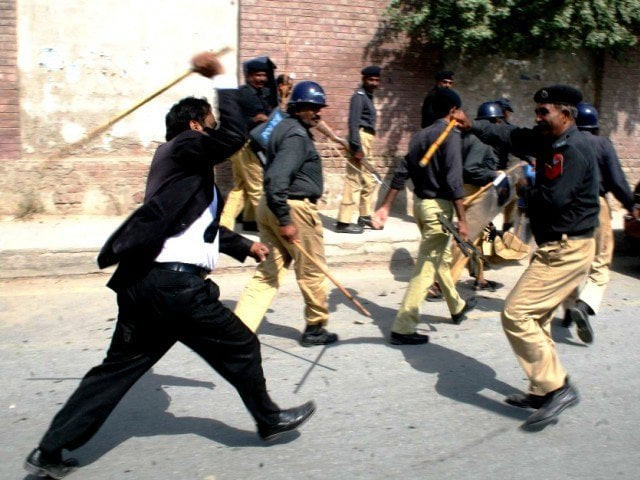PBC leader suggests steps to curb indiscipline
Complaints against judges must be decided expeditiously, letter says

Findings show only a tiny fraction of all disputes goes to courts. PHOTO: EXPRESS
Raheel Kamran Sheikh wrote a letter to the 23 PBC members, giving a number of suggestions to reform the legal system. The letter said that policies of the bar councils should be developed on the basis of essential evidence and statistics so that informed choices were made.
“There is a dire need for example to statistically study the social background, skills, earning capacities, etc of lawyers so that the profession can be regulated in the context using facts and statistics,” Sheikh said in his letter.
Lawyers riot after LHC orders arrest of Multan bar chief
He said the provincial bar councils must be made to provide the statistics along with the lists of advocates available in each district and tehsil for training the entrants, while keeping in view the required qualification, ie having more than 10-year standing.
The number of seats in law colleges must be allocated in proportion to the number of lawyers available for training the new entrants to the profession.
He said the rules for granting affiliation to law colleges must be standardised and applicable across the board.
For the benefit of already licensed lawyers, voluntary training sessions and lectures should be introduced at district and high court bars, he said.
"Out of five years LLB degree, the final year must be devoted exclusively to the teaching of application of law and procedures by practising advocates only,” the letter said.
Advocate Sheikh proposed that the issuance of licences to lawyers should be subjected to passing an entry test conducted by an organisation other than the provincial bar council, like the Higher Education Commission.
Lawyers threaten tit-for-tat approach against police
Suggesting reforms in the bar elections, he said the PBC members should be elected directly by the enrolled advocates so that the council could regulate the provincial bars effectively, without political preferences.
“Only practising lawyers with an average certain minimum number of cases in the last 3 years should be eligible to contest election and should he or she win, such a representative should not be allowed to accept more number of briefs than his average of past three years."
The letter said only practising advocates should be eligible to vote in the district and high court bar associations’ elections. No lawyer with less than a couple of years’ practice should be eligible to vote, it said.
It is proposed that an independent, fair and effective system of monitoring the perception among lawyers and clients regarding the grant of interim relief or bail should be introduced.
"In the matters of appointment of auctioneers, receivers and commissions, as well as while marking state cases in criminal matters, the judges must exercise their discretion on the basis of equality of opportunity."
The PBC leader said objective criteria and guidelines should be laid down for structuring the discretion vested in the chief justices of high courts for making nominations for elevation to the bench.
Elevation of district and sessions judges on seniority-cum-fitness, instead of extraordinary performance and contribution in terms of correct decision-making, converted the elevation to the bench as more of promotions than fresh appointments and took away the motivation in young judges to perform well, he said.
“Likewise, in the absence of objective criteria or guidelines, young and capable lawyers are hardly motivated to work hard for better assistance of courts.”
It said: "Reform of legislation should be suggested by the PBC for establishing special tribunals for the accountability of all professions imparting essential services, including legal and healthcare services, etc. to exercise jurisdiction over disciplinary matters and the composition of such a tribunal should contain 50% members from outside the profession in relation to which the complaint is being heard and decided."
The letter stated that it was one of the established principles of the independence of judiciary adopted by the United Nations more than three decades ago that all complaints against judges must be decided expeditiously. The Supreme Judicial Council should be made an effective institution and there must not be any pending complaints, it said.












1724319076-0/Untitled-design-(5)1724319076-0-208x130.webp)






COMMENTS
Comments are moderated and generally will be posted if they are on-topic and not abusive.
For more information, please see our Comments FAQ